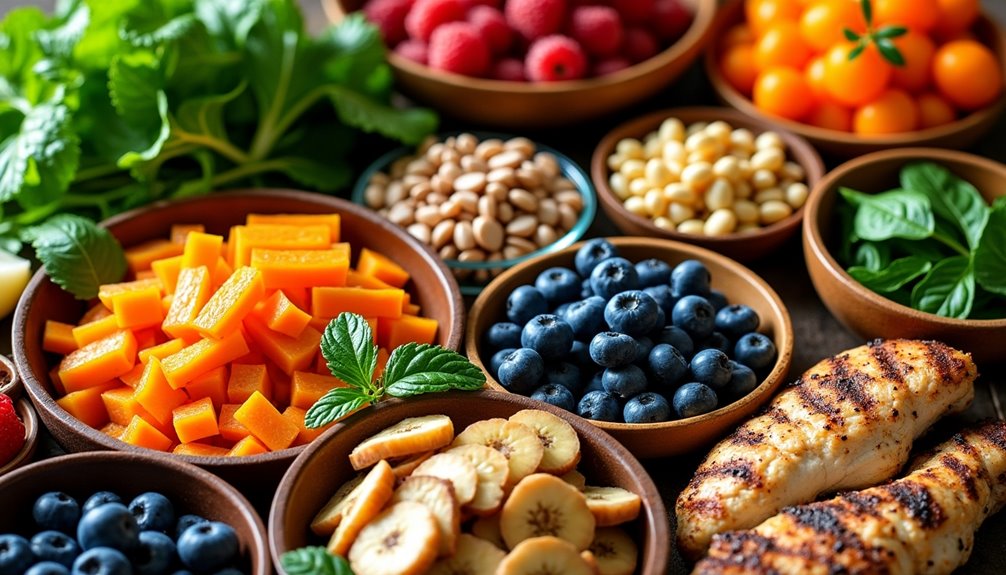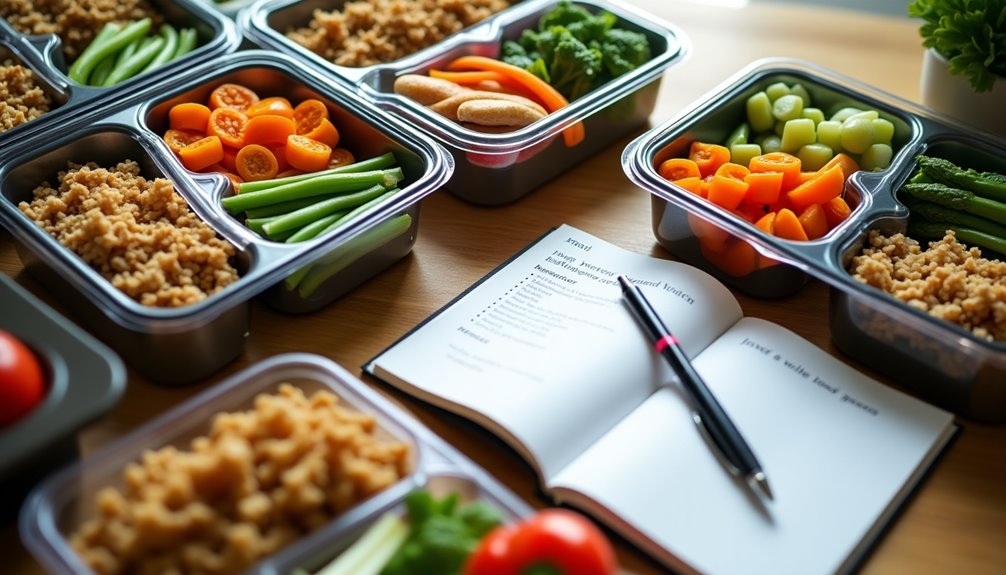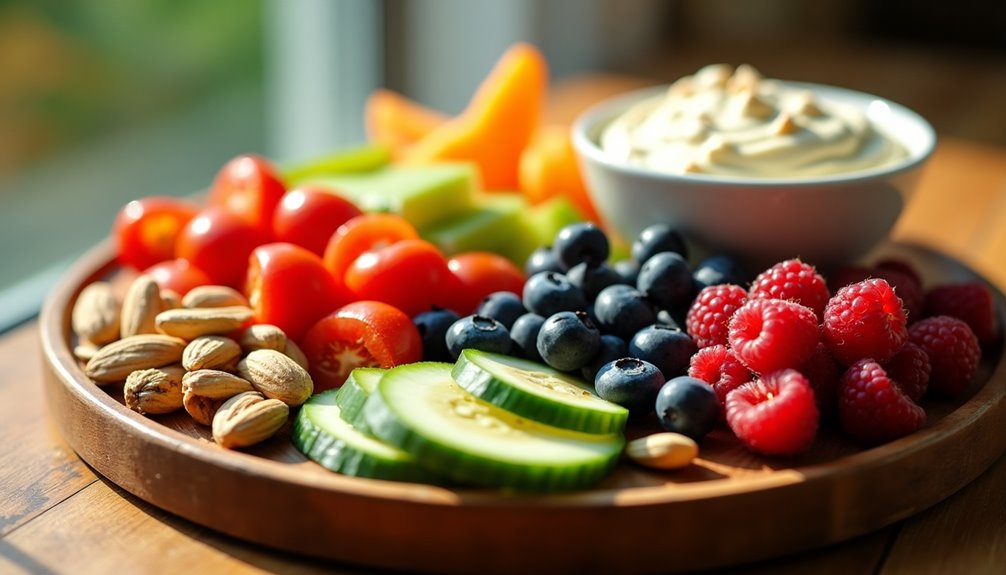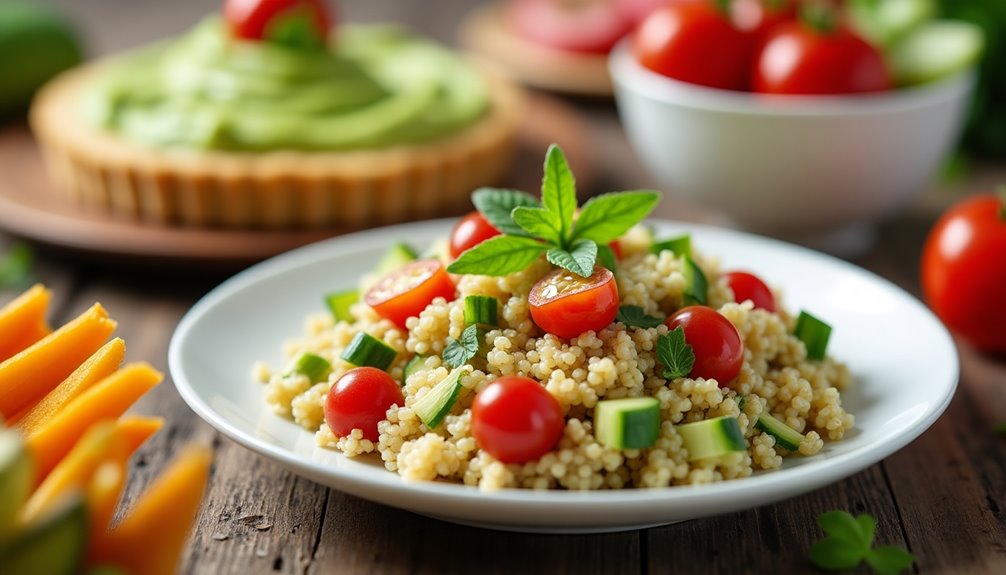A diabetic diet is essential for managing blood sugar levels and can notably reduce complications. Focus on balanced meals with whole grains, lean proteins, healthy fats, and plenty of vegetables. Monitoring portion sizes and understanding the glycemic index helps you make informed choices. Integrate fiber-rich foods to slow sugar absorption and prevent spikes. Be mindful of high-GI foods, and consider meal planning to stay on track. Snacks high in fiber and protein can provide sustained energy. By making thoughtful food choices, you'll empower yourself in your diabetes management journey. Discover more strategies to enhance your approach to eating well.
Key Takeaways
- Focus on low-GI foods to maintain stable blood sugar levels and prevent spikes.
- Incorporate whole grains, lean proteins, healthy fats, fruits, and vegetables for balanced nutrition.
- Use the plate method to control portions and include non-starchy vegetables.
- Plan snacks that are high in fiber and protein to sustain energy levels throughout the day.
- Avoid refined sugars and high-carb foods, opting for healthier alternatives instead.
Understanding Diabetes and Nutrition

Understanding diabetes and nutrition is vital for managing your health effectively. When you live with diabetes, maintaining stable blood sugar levels is pivotal. You can actively influence your blood sugar management through thoughtful dietary choices. This means being mindful of the foods you eat and how they affect your body.
A balanced diet isn't just about cutting out sugar; it's about achieving a nutrient balance that supports your overall health. Focus on incorporating whole grains, lean proteins, healthy fats, and plenty of fruits and vegetables into your meals. These foods not only provide essential nutrients but also help regulate your blood sugar levels.
For instance, fiber-rich foods can slow down the absorption of sugar, preventing spikes and crashes. Additionally, it's crucial to be aware of the health dangers of traditional bread, which can contribute to blood sugar spikes and cravings.
It's also important to pay attention to portion sizes. Eating too much of even healthy foods can lead to imbalances in your blood sugar. By using tools like meal planning and tracking what you eat, you can gain a clearer picture of how your food choices impact your health.
Key Principles of a Diabetic Diet

When managing diabetes, it is vital to adhere to key principles that guide your dietary choices. Understanding portion control and the glycemic index can greatly impact your health and help you maintain stable blood sugar levels. Portion control ensures you're not overeating, which can lead to spikes in your glucose levels. By being mindful of the amounts you consume, you can effectively manage your weight and improve your overall well-being.
The glycemic index (GI) is another crucial concept. Foods are ranked based on how they affect your blood sugar. Low-GI foods raise blood sugar slowly, while high-GI foods can cause rapid spikes. Incorporating more low-GI foods into your meals can help you maintain better control over your diabetes. Additionally, creating a custom keto diet plan can provide tailored meal options that align with your dietary needs.
Here's a simple table to illustrate some examples of foods classified by their glycemic index:
| Glycemic Index | Food Type |
|---|---|
| Low (55 or less) | Whole grains, legumes |
| Medium (56-69) | Brown rice, sweet potatoes |
| High (70 or more) | White bread, sugary snacks
Foods to Include in Your Diet

Incorporating the appropriate foods into your diet can greatly enhance your ability to manage diabetes. When you concentrate on nutrient-rich options, you create a supportive environment for your health. Start by including non-starchy vegetables like spinach, broccoli, and bell peppers. These foods are low in carbs and high in fiber, helping you feel satisfied without spiking your blood sugar.
Whole grains such as quinoa, brown rice, and oats are excellent selections. They provide necessary nutrients and fiber that can stabilize your energy levels. Remember to practice carb counting, as this will help you track your carbohydrate intake more efficiently. Aim for a balanced plate that includes protein sources like lean meats, fish, eggs, or plant-based options like beans and lentils.
Don't underestimate the significance of healthy fats, either. Avocados, nuts, and olive oil can support heart health while providing a feeling of fullness. Portion control is vital; even nutritious foods can lead to weight gain and blood sugar spikes if eaten excessively. Use measuring cups or a food scale to help you comprehend serving sizes better.
Lastly, consider incorporating low-fat dairy or dairy alternatives for calcium and vitamin D. By focusing on these foods and maintaining awareness of portion sizes, you're setting a strong foundation for managing your diabetes effectively. Remember, you're not alone on this journey—many are working towards similar goals, and making these deliberate choices can foster a sense of belonging within your community. Additionally, embracing a plant-based diet can further enhance your overall health and assist in managing blood sugar levels.
Foods to Avoid for Better Control

To better manage your diabetes, it's crucial to be mindful of certain foods that can hinder your progress. Many people underestimate the impact of refined sugars and carbohydrates on blood sugar levels. Foods like white bread, pastries, and sugary snacks can spike your glucose levels quickly. Instead, focus on whole grains and fiber-rich options that help maintain steady blood sugar.
When it comes to beverages, be cautious with sugary drinks, including sodas and sweetened teas. These can contain high levels of sugar substitutes that may confuse your body and lead to cravings. While some sugar substitutes might seem like a good alternative, they can still have effects on your insulin response. Always read labels and be aware of hidden sugars.
Carbohydrate counting is an indispensable tool in your diabetes management. By keeping track of the carbs you consume, you can make better choices and avoid those that can lead to fluctuations in your blood sugar. Pay special attention to high-carb foods like pasta, white rice, and certain fruits.
Instead, opt for protein-rich foods and healthy fats that provide sustained energy without causing spikes. Research from the Garvan Institute of Medical Research(https://www.garvan.org.au) highlights the importance of maintaining balanced blood sugar levels for overall health.
Ultimately, avoiding these specific foods doesn't mean you have to sacrifice flavor. Explore recipes that satisfy your cravings while keeping your health in check. You're not alone in this journey; many are facing similar challenges, and together, you can find a balanced approach to your diet.
Meal Planning Strategies

Effective meal planning can play a significant role in managing your diabetes while still enjoying delicious food. By focusing on portion control and carb counting, you'll empower yourself to make informed choices that fit your lifestyle. Start by determining your daily carbohydrate needs, which can vary based on factors like activity level and medications. This foundational knowledge allows you to plan meals that stabilize your blood sugar levels.
When you create your meal plan, aim to include a variety of foods to guarantee you're getting essential nutrients. Balance your plate with lean proteins, healthy fats, and high-fiber carbohydrates. Using a plate method can help; fill half of your plate with non-starchy vegetables, a quarter with lean protein, and the remaining quarter with whole grains or starchy vegetables. This method naturally encourages portion control.
Carb counting is an effective strategy that helps you keep track of the carbohydrates in your meals. Use food labels or apps to monitor your carb intake, ensuring you stay within your target range. Remember, it's not just about the quantity; focus on the quality of carbs, choosing whole grains, fruits, and legumes over refined options.
Lastly, don't forget to plan for flexibility. Life can be unpredictable, and having a few quick, healthy meal options on hand can make a world of difference. By employing these meal planning strategies, you'll feel more in control and connected to your food choices, making your diabetes management journey a little easier and more enjoyable. Additionally, lifestyle changes can significantly impact overall health, including the management of chronic conditions like diabetes.
Healthy Snacking Options

While snacking can often be a challenge for those managing diabetes, choosing the right options can support your health goals and keep your energy levels steady. It's important to seek out nutritious alternatives that not only satisfy your cravings but also help maintain stable blood sugar levels. Think about incorporating snacks that are high in fiber and protein, as these nutrients can slow down digestion and prevent spikes in blood sugar.
Some great choices include raw vegetables with hummus, Greek yogurt topped with berries, or a handful of nuts. These options provide essential nutrients while keeping you feeling full longer.
You might also consider whole-grain crackers or air-popped popcorn, which can be satisfying and low in calories.
Mindful eating plays a key role in making the most of your snacking. By savoring each bite and paying attention to your hunger cues, you'll likely enjoy your food more and avoid overeating. Create a designated snack time to help you focus, rather than mindlessly munching throughout the day.
Plan your snacks ahead of time, so you're less tempted to reach for unhealthy options when hunger strikes. Keeping a stash of healthy snacks at home or in your bag can also make it easier to stick to your goals. By prioritizing nutritious alternatives and practicing mindful eating, you can turn snacking into a positive experience that supports your diabetes management journey. Additionally, incorporating protein-packed vegan smoothies can provide a delicious and nutritious way to enhance your snack repertoire.
Delicious Diabetic-Friendly Recipes

Discovering delightful diabetic-friendly recipes can transform your meal planning and make healthy eating enjoyable. You don't have to sacrifice flavor for health; with a little creativity, you can whip up meals that satisfy your taste buds while keeping your blood sugar in check. Here are some tasty options to explore:
- Zucchini Noodles with Pesto: Swap traditional pasta for zucchini noodles, and toss them with a homemade basil pesto for a fresh, low-carb dish.
- Quinoa and Black Bean Salad: Packed with protein and fiber, this salad is perfect for carb counting and makes a great side or main dish.
- Baked Apple Slices: For a sweet treat, slice apples and bake them with a sprinkle of cinnamon. It's a simple, healthy dessert alternative that feels indulgent.
- Grilled Chicken with Avocado Salsa: Juicy grilled chicken topped with a fresh avocado salsa adds healthy fats and flavor without the extra carbs.
- Chia Seed Pudding: Mix chia seeds with unsweetened almond milk and a dash of vanilla for a delightful pudding that's both nutritious and satisfying.
Additionally, incorporating variety and creativity in meal planning can enhance your cooking experience and help maintain a balanced diet. These recipes not only fit your dietary needs but also create a sense of belonging as you share them with family and friends. Embrace the joy of cooking and eating well; you'll find that healthy meals can be both delightful and fulfilling!
Frequently Asked Questions
Can I Eat Fruit on a Diabetic Diet?
Absolutely, you can enjoy fruit! Just be mindful of your fruit servings and choose options with a lower glycemic index. Fruits like berries and apples are great choices, as they impact blood sugar less than others. Balancing portion sizes helps maintain steady levels, so don't hesitate to include these nutritious snacks in your meals.
You'll find that fruit can be a delicious and satisfying part of a healthy lifestyle!
How Often Should I Check My Blood Sugar?
Imagine the gentle beep of your glucose meter, guiding you through your health journey. You should check your blood sugar regularly, ideally before and after meals, to understand how your body responds to different foods. This blood sugar monitoring helps you adjust your meal planning and timing.
Aim for at least four times a day, but consult your doctor for personalized advice. Staying connected with your health keeps you empowered and in control.
Is Alcohol Allowed for Diabetics?
Yes, you can enjoy alcohol, but moderation is key. When you choose a drink, be mindful of its sugar content, as some beverages can spike your blood sugar. Opt for options like dry wines or spirits with low-calorie mixers.
Always check how alcohol affects your body, and consider having a snack alongside your drink to help stabilize your blood sugar levels. Staying knowledgeable guarantees you can enjoy social occasions without worry.
Can I Use Artificial Sweeteners?
Yes, you can use artificial sweeteners as sugar substitutes. They provide a sweet taste without the same calorie and carb impact as regular sugar, making them a popular choice for those managing their diet.
When you're carb counting, these sweeteners can help you satisfy your cravings while keeping your carbohydrate intake in check. Just remember to choose wisely, as different sweeteners have different effects on your body and overall health.
What Are the Symptoms of Diabetic Hypoglycemia?
"When it rains, it pours." Understanding the symptoms of diabetic hypoglycemia is essential for managing episodes effectively.
You might experience shakiness, sweating, confusion, or irritability. Identifying triggers, like missed meals or excessive exercise, helps you take preventive measures.
If you notice these signs, treating it quickly with glucose can make a difference. Remember, recognizing and addressing hypoglycemia fosters a sense of control and belonging in your health journey.
Conclusion
Incorporating a diabetic diet into your life doesn't just help manage your blood sugar; it can make you feel like a superhero tackling your health challenges head-on! By focusing on nutritious foods, avoiding certain pitfalls, and planning your meals wisely, you'll not only maintain better control but also enjoy a variety of delicious options. Remember, every small change adds up, so embrace this journey, and you'll find that a fulfilling, healthy lifestyle is well within your reach!



